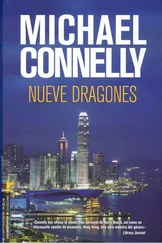“I’ll go get the ladder,” said the forensic tech. “Can you hold this?”
Her name was Carolyn Cafarelli and Bosch knew most people called her Cal. She handed the gas probe, a yellow T-shaped device, to Bosch and started back through the woods.
“I’ll help her with it,” Rider said.
“No,” Bosch said. “Everybody carrying a weapon stays with Waits.”
Rider nodded, realizing he was right.
“I can handle it,” Cafarelli called out. “It’s lightweight aluminum.”
“I just hope she can find her way back,” O’Shea said after she was gone.
For the first few minutes they waited in silence, then Waits spoke to Bosch.
“Anxious, Detective?” he asked. “Now that we’re so close.”
Bosch didn’t respond. He wasn’t going to let Waits get inside his head.
Waits tried again.
“I think about all the cases you have worked. How many are like this one? How many are like Marie? I bet she-”
“Waits, shut the fuck up,” Olivas commanded.
“Ray, please,” Swann said in a soothing voice.
“Just making conversation with the detective.”
“Well, make it with yourself,” Olivas said.
The silence returned until a few minutes later, when they all heard the sound of Cafarelli carrying the ladder through the woods. She banged it a few times on low-level limbs but finally got it to their position. Bosch helped her slide it down the slope and they made sure it was steady on the steep incline. When he stood up and turned back to the group Bosch saw that Olivas was uncuffing one of Waits’s hands from the chain running around the prisoner’s waist. He left the other hand secured.
“The other hand, Detective,” Swann said.
“He can climb with one hand free,” Olivas insisted.
“I am sorry, Detective, but I am not going to allow that. He has to be able to hold on and break a fall if he happens to slip. He needs both hands free.”
“He can do it with one.”
While the posturing and debate continued, Bosch swung himself onto the ladder and went down the slope backwards. The ladder was steady. At the bottom he looked around and realized that there was no discernible path. From this point the trail to Marie Gesto’s body was not as obvious as it had been above. He looked back up at the others and waited.
“Freddy, just do it,” O’Shea instructed in an annoyed tone. “Deputy, you go down first and be ready with that shotgun in case Mr. Waits gets any ideas. Detective Rider, you have my permission to unholster your weapon. You stay up here with Freddy and be ready as well.”
Bosch climbed back up a few steps on the ladder so the deputy could carefully hand him the shotgun. He then stepped back down and the uniformed man came down the ladder. Bosch gave him back the weapon and returned to the ladder.
“Toss me the cuffs,” Bosch called up to Olivas.
Bosch caught the cuffs and then took a position two rungs up on the ladder. Waits began to go down while the videographer stood at the edge and recorded his descent. When Waits was three rungs from the bottom Bosch reached up and grabbed the waist chain to guide him the rest of the way to the lower ground.
“This is it, Ray,” he whispered in his ear from behind. “Your only chance. You sure you don’t want to make a run for it?”
Safely at the bottom, Waits stepped off the ladder and turned to Bosch, holding his hands up for the cuffs. His eyes held on Bosch’s.
“No, Detective, I think I like living too much.”
“I thought so.”
Bosch cuffed his hands to the waist chain and looked back up the slope at the others.
“Okay, we’re secure.”
One by one the others came down the ladder. Once they had regrouped at the bottom O’Shea looked around and saw that there was no longer a path. They could go in any direction.
“Okay, which way?” he said to Waits.
Waits turned in a half circle as if seeing the area for the first time.
“Ummmm…”
Olivas almost lost it.
“You better not be pulling-”
“That way,” Waits said coyly as he nodded to the right of the slope. “Lost my bearings there for a second.”
“No bullshit, Waits,” Olivas said. “You take us to the body right now or we go back, go to trial and you get the hot shot of Jesus juice you’ve got coming. You got that?”
“I got it. And like I said, this way.”
The group moved off through the brush with Waits leading the way, Olivas clinging to the chain at the small of his back and the shotgun never more than five feet behind.
The ground on this level was softer and more muddy. Bosch knew that runoff from last spring’s rains had likely gone down the slope and collected here. He felt his thigh muscles begin to tighten as every step was a labor to pull his work boots from the sucking mud.
In five minutes they came to a small clearing shaded by a tall, fully mature oak. Bosch saw Waits looking up and followed his eyes. A yellowish-white hair band hung limply from an overhead branch.
“It’s funny,” Waits said. “It used to be blue.”
Bosch knew that at the time of Marie Gesto’s disappearance she was believed to have had her hair tied back with a blue hair band known as a scrunchy. A friend who had seen her earlier on that last day had provided a description of what she was wearing. The scrunchy was not with the clothing found neatly folded in her car at the High Tower Apartments.
Bosch looked up at the hair band. Thirteen years of rain and exposure had taken its color.
Bosch lowered his eyes to Waits, and the killer was waiting for him with a smile.
“We’re here, Detective. You’ve finally found Marie.”
“Where?”
Waits’s smile broadened.
“You’re standing on her.”
Bosch abruptly stepped back a pace and Waits laughed.
“Don’t worry, Detective Bosch, I don’t think she minds. What was it the great man wrote about sleeping the big sleep? About not caring about the nastiness of how you died or where you fell?”
Bosch looked at him for a long moment, wondering once again about the literary airs of the window washer. Waits seemed to read him.
“I’ve been in jail since May, Detective. I’ve done a lot of reading.”
“Step back,” Bosch said.
Waits opened his cuffed hands in a surrender move and stepped toward the trunk of the oak. Bosch looked at Olivas.
“You got him?”
“I got him.”
Bosch looked down at the ground. He had left footprints in the muddy earth but it also looked like there was another, recent disturbance in the soil. It looked as though an animal had made a small dig in the ground, either foraging or burying its own dead. Bosch signaled the forensics tech over to the center of the clearing. Cafarelli stepped forward with the gas probe and Bosch pointed to the spot directly below the colorless hair band. The tech pushed the point of the probe into the soft soil and easily sank it a foot into the earth. She clicked on the reader and began studying the electronic display. Bosch stepped toward her to look over her shoulder. He knew that the probe measured the level of methane in the soil. A buried body releases methane gas as it decomposes. Even a body wrapped in plastic.
“We’re getting a read,” Cafarelli said. “We’re above normal levels.”
Bosch nodded. He felt strange inside. Out of sorts. He had been with the case for more than a decade and a part of him liked holding on to the mystery of Marie Gesto. But, while he didn’t believe in something called closure, he did believe in the need to know the truth. He felt that the truth was about to reveal itself, and yet it was disconcerting. He needed to know the truth to move on, but how could he move on once he no longer needed to find and avenge Marie Gesto?
Читать дальше












